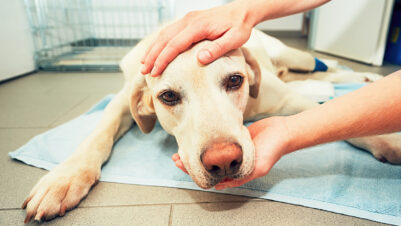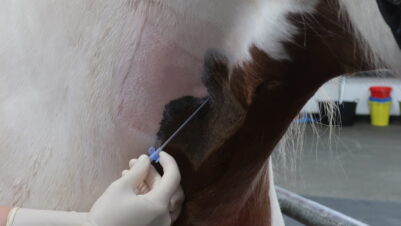IT is Friday afternoon in an equine practice. The partners’ diaries are filled and everyone is busy when the phone goes with a request for a veterinary surgeon to attend a problem case on behalf of one of the welfare charities.
This was the scene for The expert witness: a personal view, presented at the BEVA congress in September by Brigadier Paul Jepson of The Horse Trust.
He said that the most likely solution is that the most inexperienced member of the practice is catapulted on to the scene with no warning.
This is regrettable from the point of view of the charity which needs successful prosecutions to raise awareness that cruelty is illegal and punishable as well as morally objectionable. Also, prosecutions are very expensive, so the charity deserves good input from the veterinary surgeon.
“Bad” welfare is a calamity; “inadequate” welfare is best addressed by education and persuasion and many cases can be resolved without the need for litigation.
Witness and clinician
When this sort of emergency call comes in, it needs commitment from the outset. Experience is a great asset but as long as the attending veterinary surgeon takes on the role of witness as well as clinician, the job will be done well.
Experience, planning and coordination are the three essentials. Planning involves being familiar with the legal foundation for your action. Essential reading includes the RCVS Guide to Giving Evidence in Court, the Code of Practice for the Welfare of Equines and the Equine Welfare Guidelines Compendium*.
The difference between factual, professional and expert witnesses is explained in the RCVS guide. You will need to provide factual evidence of your observations, actions and conversations. All this needs to be recorded accurately and as soon as possible after the event. Rain-spattered notes go down well in court and events tend to crowd out memory so don’t postpone making records. The outcome of the case depends on them. You can get someone else to do the writing while you are examining the animals.
It is essential to identify all the animals involved, each animal needs an individual number that is easily read on its photographs and correlates with the written records. Little details like tying up the tail to show skinny buttocks, or having someone’s hand spanning the gap between them can be used to emphasise a problem.
Every animal must be given a thorough clinical examination which is fully recorded; for example, you need to record temperature, pulse rate and respiratory rate. Recorded details are the stuff of success.
You will be cross-examined by the defendant’s solicitor whose expertise is honed to making the witness look inadequate and unprofessional. This is where experience helps but sound clinical procedures, backed up by detailed accurate records will withstand questioning.
Credentials queried
You may be asked to provide expert opinion evidence and then the defence will query your credentials. This should not be seen as a personal attack, it’s just technique!
So, planning involves the legal background. The RCVS is very helpful in providing support, as are colleagues. At the scene it is useful to plan a course of action, keep cool and give it plenty of time. Co-operation with the police and the welfare organisation personnel is essential: they can provide excellent guidance and they have plenty of experience.
If the horse needs to be euthanased, get a police officer to order the destruction and get his or her name and number. It is best to getasigned instruction to destroy the animal, complete with log number. Again, keep recording. If necessary, have a post-mortem carried out to confirm your findings and remember to record anything that goes on about the case after the original investigation.
The court case itself is likely to be frustrating. It is likely to take place a long time after the event, dates and times can be changed and there may be a long time hanging around waiting to be called. However, it is essential that veterinary surgeons are willing to undertake this work, we each have a moral and professional obligation to support the legislation which is there to ensure the well-being of the horse.
Problems in Ireland
Joe Collins of University College Dublin described a study which looked at Equine Welfare Problems in Ireland. In reality, animal welfare standards are determined by the attitudes of the people involved, the “stakeholders”, and the law.
In order to investigate what people see as a welfare problem and how they think it should or could be tackled, Mr Collins’ group employed the Delphi method. This is a qualitative research tool that allows investigation of a controversial subject. It is web-based and Round One involved showing 29 vignettes to 44 people who were regarded as being important opinion-formers.
They were selected from the horse industry, government and charity groups to give a broad cross-section. The vignettes were made up of pictures and narrative so that each told the story of an infringement of welfare based on the Five Freedoms. Each incident was scored by the observers for acceptability and frequency of occurrence.
The information thus gathered was used to create the material for Round Two. This consisted of lists of potential equine welfare issues (such as breeding practices and transport), and what makes people behave in a way that is bad for horses (examples being ignorance and financial gain) relevant to each issue, and potential solutions (such as education and legislation) for each issue.
These were scored to give the material for Round Three which presented the issues judged most significant in Round Two. These were the disposal of horses, trade, and the welfare of horses at unregulated gatherings. Vignettes were used to illustrate these issues and the participants scored the desirability, feasibility and means of improving standards and gave their comments in free text. Regulation, suitably enforced, scored highest as a means to improve welfare.
Economic factors were blamed for poor treatment of horses in the horse disposal trade. Unwanted horses of low value are obtained to sell for slaughter and are often kept in very poor conditions.
“Lightly regulated gatherings” cover anything from traditional horse fairs such as Ballinasloe Fair to racing at dawn on the motorway. In towns, children ride ponies too small for them without any awareness of the damage to the animal or, for that matter, any risk to themselves or passers-by.
Poor practices
Practices such as weaning foals at marts (mother goes back home, foal goes to the new owner) have implications for the future welfare of the foal. Poor tying-up or the complete lack of it, lack of food and water or a communal trough which is likely to become contaminated or spread disease, are among the problems encountered at fairs. Neglected feet, hoof trimming by people with insufficient knowledge and poor transport add to the problems.
Tradition is not always beautiful or beneficial to the animals and although regulation can be seen as repressive and an encroachment on human freedom, it may be the only effective way to improve the welfare of these horses.
* Published by the National Equine Welfare Council: telephone 01926 866655, e-mail info@newc.co.uk, website www.newc.co.uk.






